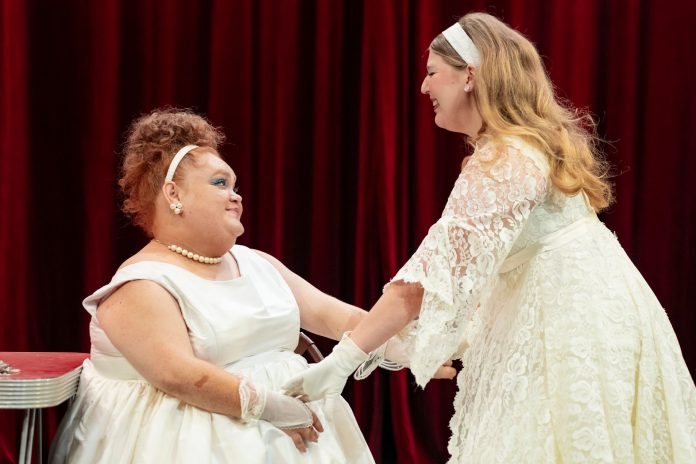Big Girls Don’t Cry
Writer: Dalara Williams
Director: Ian Michael
Belvoir St Theatre
April 5-27, 2025
Writer Dalara Williams drew her inspiration from the stories she listened to throughout her childhood about her family’s involvement in the Aboriginal resistance movement. It was in the ’60s when the fight for Indigenous rights gained momentum through events like the Freedom Rides and the referendum for citizenship.
Cheryl, Lulu and Queenie have come to Sydney to work and experience the fun of city life. It’s 1966, and if not quite swinging London, Redfern and Sydney have a lot to offer. Their infectious enthusiasm as they negotiate the era’s fun fashions, possible romances and the upcoming Aboriginal Debutante Ball, is delightful. Extending their social group is Cheryl’s brother Ernie (Guy Simon), a committed civil rights activist, and his friend Milo (Nic English), the son of Italian immigrants.
But it’s not all plain sailing – they soon become aware that being Aboriginal in Sydney in the ’60s is a social minefield of both subtle and obvious prejudice. While innocently having drinks at a pub, the group is harassed by Officer Robinson (Bryn Chapman Parish) who starts a vindictive tirade against Ernie, resulting in a fight and a night in jail for the young man.
They are all young though, and thoughts of romance are never far away. Cheryl endures the long absence of her lover Michael, who is serving in Vietnam. This creates a dilemma for her, as Milo, Ernie’s friend, is drawn to her. The repartee between Queenie and Ernie generates a lot of hilarious comedy which disguises their underlying attraction.
The cast, particularly the female actors, do a fine job of developing well-rounded characters and enhancing our interest in the fates of these young people: Cheryl, played by Dalara Williams, impresses as a reserved girl anxious about her relationship, Lulu (Stephanie Somerville) comes across as the sweet quiet one, but is cannily perceptive, and as Queenie, Megan Wilding is a stand-out, notably for her well-timed comedic skills. The male characters also perform admirably in their respective roles, not forgetting Michael (Mathew Cooper) who appears in Cheryl’s thoughts, reading his letters to her.
Director Ian Michael has aimed for a warm upbeat vibe throughout and, despite the narrative’s negative events, has created an engaging, audience-friendly production.
The costuming (Emma White) is particularly memorable, the ’60s being a mix of quirky and colourful casual wear as well as elegant formal wear. The minimalist set (Stephen Curtis) is a revolve which helps enliven the action, and the props authentically reflect the period. The sound design (Brendon Boney) utilises some very recognisable ’60s pop tunes and some lively incidental music together with a subtle soundscape of city life.
Despite its length, it’s a story redolent with charm, warmth and appealing characters, with a little nostalgia thrown in for the older audience. It’s also an affirmation of the importance of “sisterhood” amongst female friends which the play so clearly illustrates – it’s a very enjoyable production!





